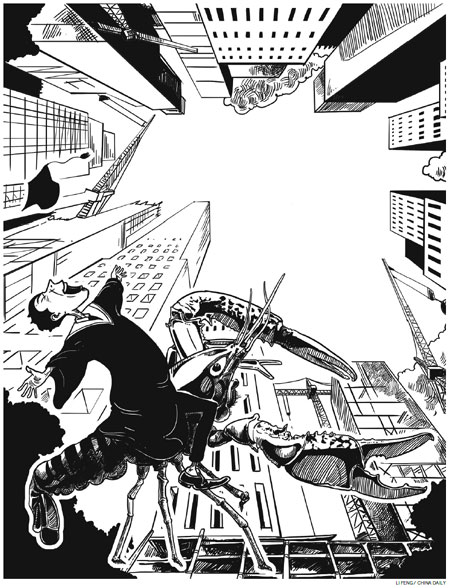Those who dare to do something different
By Wang Shanshan ( China Daily ) Updated: 2015-09-05 08:03:52
A PhD student who sells crayfish is a paragon of the entrepreneurial age
A few weeks ago I received a phone call from a girlfriend who asked me out. We met in a restaurant, and after a few minutes' chitchat she breathlessly served up this morsel of news: her former boyfriend had gone into business of selling crayfish.
Her ex, fast approaching 40, is studying for a doctorate in philosophy in Beijing. At the same time he has been looking for work, and a month ago he opened an online shop on WeChat, the mobile messaging service.
The shop is called Dr Crayfish, and he messaged his contacts saying that as the founder of a startup company he needed their support.
On a typical day, he said, he arrives at one of Beijing's main railway stations at 6:30 am to take delivery of crayfish transported from the south, then goes home and begins cleaning the crayfish.
He cooks them twice a day, in the morning and in the afternoon, in preparation for lunch and dinner orders, he said. Around noon he works on his PhD thesis as the prepared crayfish is sent to customers by courier.
An order of his crayfish meant for two people weighs 1.5 kg and costs 288 yuan ($47). That is as expensive as in well-known 24-hour restaurants in Guijie (Ghost Street), a gourmet strip in Beijing. There the smell of crayfish, with spice and pepper, permeates the air day and night.
On a good day, he said, he receives more than 10 orders. But three weeks after he opened his shop I was one of only 16 people who had used WeChat to register our "like" of his shop.
I met this man once, five years ago. We went to a bar late one evening to watch a World Cup soccer match, which his team, Argentina, lost. Afterwards he lay down in the street sobbing like a lost child. This was in the wee hours, and it took the rest of us, including his girlfriend, more than 20 minutes to get him back on his feet and heading towards home.
You may think such grief over losing a soccer game is a little over the top, but five years earlier this man had every reason to cry - he lost his job. In that instance he had been an engineer with a multinational information technology company and was sacked in a mass layoff. However, he managed to pick himself up and find another job with a Chinese company, only to lose that job later, too, which is when he applied to do the PhD program.
This new venture of Dr Crayfish, as my girlfriend now calls him, adds to our impression that somehow everyone around us is starting a business.
When I returned to Nanjing, my hometown, for the Spring Festival in January, I met my cousins for our annual get-together. Three men were at the table, each of whom was busy setting up a company.
One had worked for a state-owned research institute as an electronics scientist. He quit at the end of last year and with two friends set up a business selling mobile devices. Another cousin founded a company that works in computer programming, and the third has set up a company selling organic produce.
Their message seemed to be this: "Us men have to work hard; you women only need to have a stable job and find a hard-working husband."
The inference was that unless you run your own company you are not working particularly hard.
A similar refrain can often be heard these days relating to the media industry. "Why on earth are you still working in the media?" the line goes, "because in the past couple of years so many smart editors of magazines and smaller newspapers have abandoned ship to set up their own businesses."
Talk of abandoning ships may seem as overwrought as men crying over soccer games, but when you hear of falls in advertising revenue of 50 percent it doesn't seem that far-fetched. There is now talk in the industry that the editor-in-chief of a well-known news magazine has just quit to become vice-president of communications for a startup food-delivery company.
Let's face it: entrepreneurship is as much a talent as writing, engineering, selling or playing soccer. In almost all cases the entrepreneurial talents of the businesspeople I know were evident early on, whether it was selling chocolate bars in university dormitories or trying their hand at some other kind of business, even as people like me thought they were simply wasting their time.
In their hard work and their perseverance they have acquired leadership skills, good mental attitudes and the kinds of social connections that are essential in running a successful business.
As for me, any flicker of entrepreneurial talent is, so far as I know, absent. However, I am sure that Dr Crayfish would never come out with such a flinching assessment of his own skills. In line with the Darwinian model of fitness and survival, the motto of such people seems to be: "He who dares to succeed must dare to do something different."
wangshanshan@chinadaily.com.cn
|
|
|
|
|
|
|
|

























 Raymond Zhou:
Raymond Zhou: Pauline D Loh:
Pauline D Loh: Hot Pot
Hot Pot Eco China
Eco China China Dream
China Dream China Face
China Face






